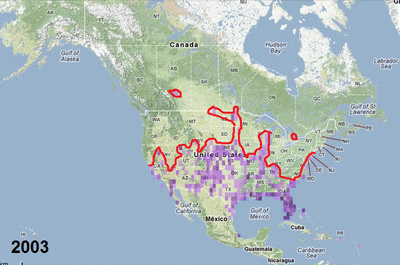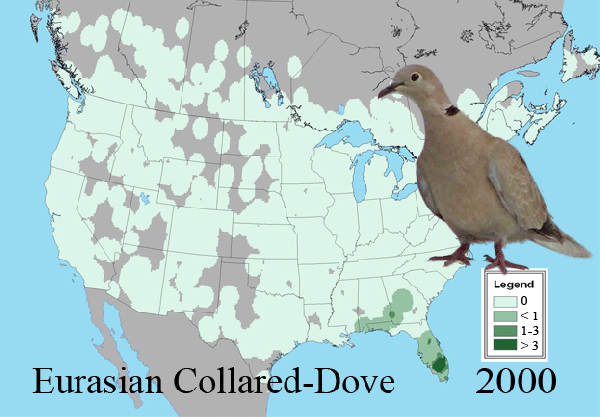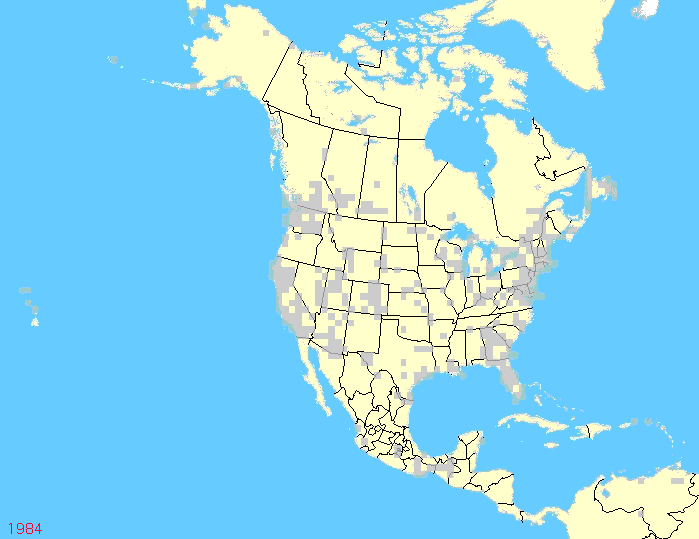Eurasian Collared-Doves
Conquering America
January 17, 2011
January 17, 2011

No species of bird has colonized North America at the speed with which the Eurasian Collared-Dove (Streptopelia decaocto)
has marched across the continent. First found nesting just south of
Miami, Florida, in 1982, this non-native dove has rapidly adapted to
human-altered environments from Florida to Alaska.
FeederWatch has
provided a crucial source of information on this invasion and insight
into how this invader may be affecting populations of native doves.

Eurasian Collared-Doves.
Researchers at the Cornell Lab of Ornithology recently focused on
reports submitted by444 FeederWatchers in Florida to better understand
the collared-dove invasion. First, they were interested in examining the
potential impact of collared-doves on other dove species such as the
Mourning Dove, White-winged Dove, and Common Ground-Dove. Many invasive
species have a negative impact on native species, particularly species
that are similar to the invader. Contrary to expectations, however,
researchers found that the abundance of native dove species was
generally greater at sites with collared-doves than at sites without
collared-doves.
Second, researchers were interested in identifying which types of
habitats the collared-doves were using. Linking satellite-derived land
cover data with FeederWatch data gathered from 1999 to 2008, the
researchers found that collared-doves were more likely to occur in
landscapes that had been highly-modified by human activity than in
forested landscapes. Many invasive species are successful because, like
the collared-dove, they can readily adapt to suburban life.

Animation of the Eurasian Collared-Dove expansion, 2000-2009.
Photo by Kevin Carver.
Photo by Kevin Carver.
What’s next for the Eurasian Collared-Dove?
The species continues to spread across the continent and grow in
abundance (map above shows an animation of the range
expansion). The doves naturally disperse in a northwesterly direction,
so the most rapid range expansion has taken place along a
southeast-to-northwest path from Florida to Alaska.
It appears to be
only a matter of time, however, before the gaps in the species’ range in
the Midwest and Northeast are colonized. FeederWatch staff will keep an
eye on interactions between collared-doves and native species as the
invasive species continues to colonize different regions and
environments. We may ultimately find that collared-doves do compete for
food with other dove species in colder regions in winter.
If you would like to contribute data on the spread of Eurasian Collared-Doves, please consider joining Project FeederWatch.
The only way we can track the spread of this species is with data
submitted by FeederWatch Participants – so sign up to contribute! Please
note that commenting on this post with Eurasian Collared-Dove
observations will NOT contribute to data!
Did you find a Eurasian Collared-Dove nest? Check out our post on monitoring Eurasian Collared-Dove nests!
Source: Bonter, D. N., B. Zuckerberg, and J. L. Dickinson.
2010. Invasive birds in a novel landscape: habitat associations and
effects on established species. Ecography 33:494-502.
*
Project Feederwatch staff - January 17, 2011
Eurasian Collared-Doves are native to southern Asia. They were introduced in the Bahamas in the 1970s (escaped from the pet trade), and subsequently spread to south Florida. From Florida they are moving across all of North America. Eurasian Collared-Doves are very successful invaders. They conquered much of Europe since the 1950s and continue to expand their range in Europe as well.
* Eurasian Collared-Doves are native to southern Asia. They were introduced in the Bahamas in the 1970s (escaped from the pet trade), and subsequently spread to south Florida. From Florida they are moving across all of North America. Eurasian Collared-Doves are very successful invaders. They conquered much of Europe since the 1950s and continue to expand their range in Europe as well.
http://projectfeederwatch.wordpress.com/2011/01/17/eurasian-collared-doves-conquering-america/



No comments:
Post a Comment